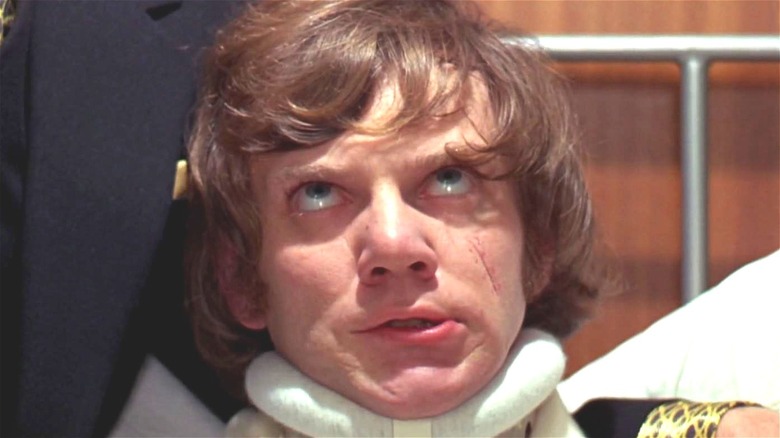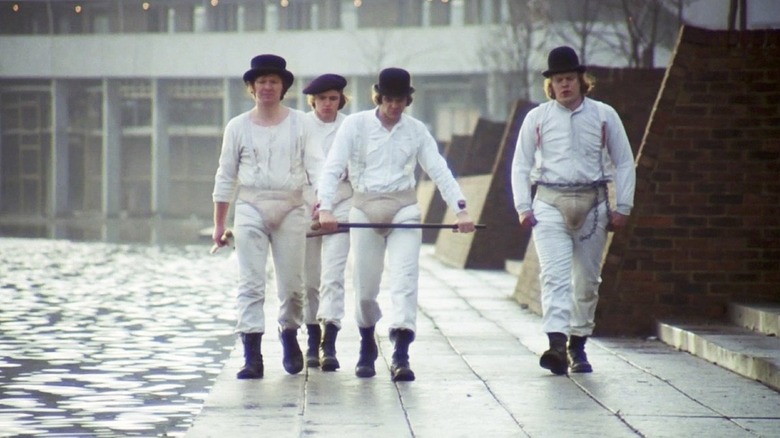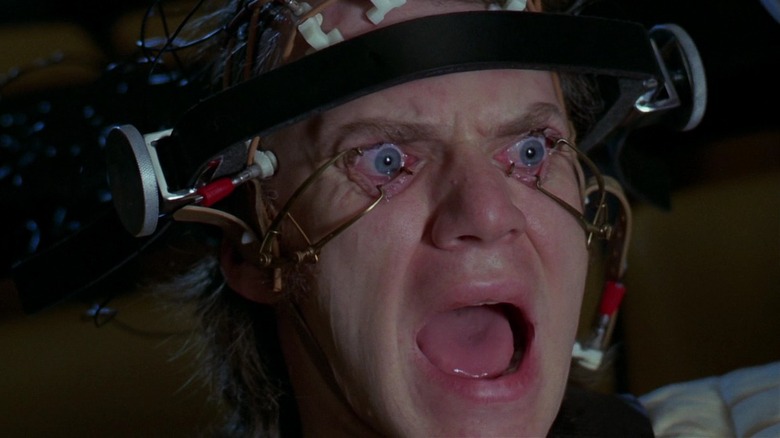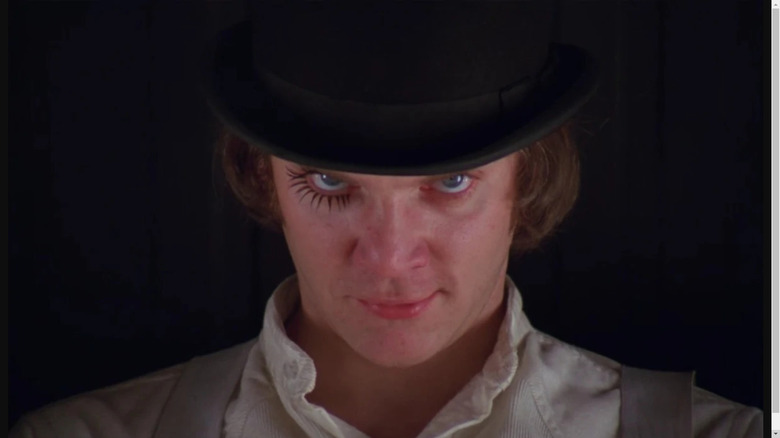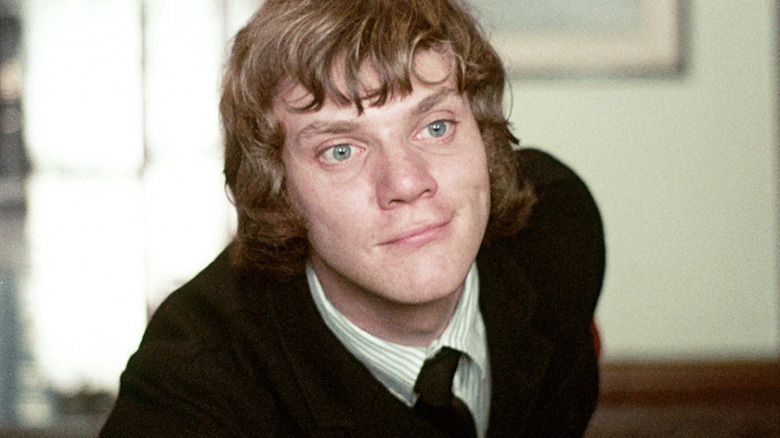The Ending Of A Clockwork Orange Finally Explained
Pretty much any film with Stanley Kubrick's name attached to it has a legendary reputation in cinema. Kubrick is considered one of history's most influential filmmakers, in no small part due to the controversial nature of his works. It is no surprise, then, that "A Clockwork Orange" remains one of his most lauded films while also necessitating the biggest warning. In making a film with deeply poignant messages about free will, politics, and morality, Kubrick employs graphic depictions of sexual violence, suicide, and psychological torture.
Yet, the film is also oddly bittersweet. Its protagonist, Alex DeLarge (Malcolm McDowell), is equal parts vile and sympathetic. Though he begins as a violent psychopath, his abuse at the hands of society via the experimental Ludovico Treatment is equally horrific. The final shot of Alex, finally cured of the Ludovico's effects, draws up many conflicting feelings and even more questions. Yes, Alex is cured, but he isn't a better person. On top of that, does the fact that he is cured mean that he is free when he is still at the mercy of a corrupt system? The ending of "A Clockwork Orange" demands some explanation.
Being good isn't good when it strips away free will
One of the central themes in "A Clockwork Orange" is the concept of free will and how it interacts with our standard for morality. Alex DeLarge — though he is a rapist and a murderer — is free at the film's beginning. While he uses his freedom to commit selfish acts of evil, he isn't abused by the state. That changes, however, when he is finally arrested and imprisoned for his crimes. Kubrick himself says as much in an archived interview with French film critic Michel Ciment (via The Kubrick Site).
"I think the dramatic impact of the film has principally to do with the extraordinary character of Alex ... Aaron Stern, the former head of the MPAA rating board in America, who is also a practicing psychiatrist, has suggested that Alex represents the unconscious: man in his natural state," he said. "After he is given the Ludovico 'cure,' he has been 'civilized', and the sickness that follows may be viewed as the neurosis imposed by society."
Before you think that Kubrick is arguing in favor of allowing someone like Alex DeLarge to pillage as he pleases in the name of freedom, however, it's important to understand what the film's Ludovico treatment does. Using behavioral conditioning, the treatment forces Alex to experience great physical and mental pain at the thought of sex or violence. When Alex leaves prison, his "goodness" (as the prison's chaplain points out) doesn't come from within — it's forced.
Being an ex-con is a sorry state for the average droog
The fact that Alex's good behavior is artificial and not the result of a genuine change in his morality ties deeply into another core message of "A Clockwork Orange": the state is willing to manipulate its citizens for its own goals. When the good doctors are finally done torturing Alex into peaceful submission, the prison touts his change to the media as an advancement of science. They consider it a new, humane method of rehabilitation despite the fact Alex technically isn't rehabilitated, and they don't much care what happens to him once he leaves.
Once Alex tries to re-enter society, things go less than well for him. In many ways, it is similar to how real ex-cons are prevented from effectively rejoining society through discrimination in employment, housing, and public assistance (via the American Psychological Association). Granted, Alex is literally beaten and ridiculed by the same people he tormented at the beginning of the film. But the message is still clear: Society is often unkind to ex-cons, and the state doesn't often seem to care.
That is unless they still have a use for Alex, which Frank Alexander – a man who Alex graphically assaults at the beginning of the film – does. Frank also has political connections and currently has interests in opposing the state. After rescuing the abused Alex, Frank and his allies plan to use him as a pawn in their push for political change.
The only freedom is state-sanctioned freedom
In another world, Frank would have used Alex just like everyone else. However, he eventually recognizes Alex as the man who crippled him and raped his wife and decides to use Alex's aversion to Beethoven (a side effect of the Ludovico treatment) to torture him into attempting suicide. Things change, however, when Alex wakes up in the hospital. Britain's Minister of the Interior is there to greet him and even apologizes for the Ludovico treatment. Now cured, the minister asks for Alex's support in the next election. The film comes to a bittersweet conclusion, as Alex revels in sexual fantasies to Beethoven's Ninth Symphony, finally free to do as he pleases again. This delivers the film's final message: The only ones who are "free" (if Alex is, indeed, free) are only granted that status through political privilege, which is not based on moral merit.
"The government eventually resorts to the employment of the cruelest and most violent members of the society to control everyone else — not an altogether new or untried idea," Stanley Kubrick told Michel Ciment (via The Kubrick Site). "In this sense, Alex's last line, 'I was cured all right,' might be seen in the same light as Dr. Strangelove's exit line, 'Mein Fuehrer, I can walk.' The final images of Alex as the spoon-fed child of a corrupt, totalitarian society, and Strangelove's rebirth after his miraculous recovery from a crippling disease, seem to work well both dramatically and as expressions of an idea."
If you or anyone you know is having suicidal thoughts, please call the National Suicide Prevention Lifeline at 1-800-273-TALK (8255).
But wait ... there's more!
The ending of "A Clockwork Orange" is equal bits satisfying and unsatisfying. Though we sympathize with Alex, he is hardly a figure whose freedom to wreak havoc should be celebrated. At the same time, the people who actually deserve sympathy are ignored. The people who Alex tormented and killed receive no boons for their trouble — only Alex and the corrupt officials he now works for come out smiling.
It's no surprise, then, why the author of the original "A Clockwork Orange" novel, Anthony Burgess, was so at odds with the adaptation's ending. Indeed, it leaves out an entire chapter that ends on a much more positive note, though this is through no fault of Kubrick's. Until 1986, the book's publishers omitted the final chapter in the United States, so Kubrick hadn't read the final chapter until he had already finished making the movie (via Consequence of Film).
In this lost chapter, Alex becomes disenchanted with his criminal lifestyle. After a chance encounter with his old droog, Pete, Alex decides to and "grow up" (per Consequence of Film). It's a much more happy-go-lucky ending about how a person must decide to do good of their own volition. However, it is one that can seem too fantastical to be real, especially when Alex's youthful crimes are so depraved. Nevertheless, it is an ending which many — including the author himself — find preferable to Kubrick's own cynical conclusion.
